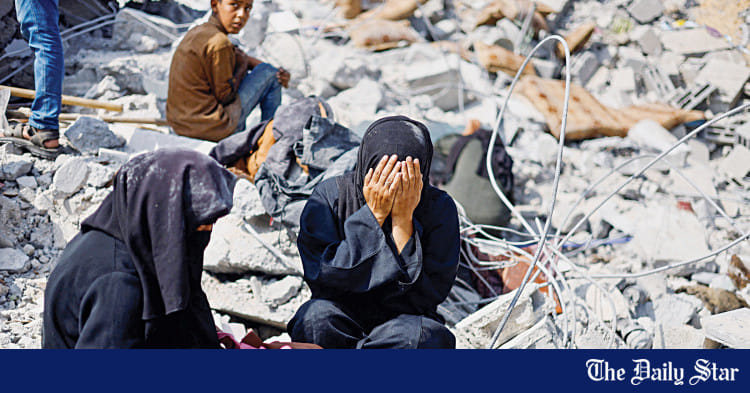Saif
Senior Member
- Messages
- 17,408
- Likes
- 8,374
- Nation

- Residence

- Axis Group


ফিলিস্তিনের প্রতি সংহতি, যুক্তরাজ্যের ‘ডক্টরেট’ ডিগ্রি ফিরিয়ে দিলেন শহিদুল আলম
২০২২ সালের ৮ জুলাই লন্ডনের রয়্যাল ফেস্টিভাল হলে তিনি এই ডিগ্রি গ্রহণ করেন।
ফিলিস্তিনের প্রতি সংহতি, যুক্তরাজ্যের 'ডক্টরেট' ডিগ্রি ফিরিয়ে দিলেন শহিদুল আলম
২০২২ সালের ৮ জুলাই লন্ডনের রয়্যাল ফেস্টিভাল হলে তিনি এই ডিগ্রি গ্রহণ করেন।

আলোকচিত্রী শহিদুল আলম। ছবি: সংগৃহীত
ফিলিস্তিনের প্রতি সংহতি জানিয়ে যুক্তরাজ্যের ইউনিভার্সিটি অব আর্টস লন্ডনের (ইউএএল) সম্মানসূচক 'ডক্টরেট' ডিগ্রি ফিরিয়ে দিয়েছেন আলোকচিত্রী ও মানবাধিকারকর্মী শহিদুল আলম।
রোববার দৃক পিকচার লাইব্রেরি লিমিটেডের এক সংবাদ বিজ্ঞপ্তিতে এ তথ্য জানানো হয়েছে।
এতে বলা হয়, ফটোগ্রাফি ও অ্যাক্টিভিজমে অসামান্য অবদানের স্বীকৃতিস্বরূপ ইউনিভার্সিটি অব আর্টস লন্ডন শহিদুল আলমকে একটি সম্মানসূচক ডক্টরেট প্রদান করে। ২০২২ সালের ৮ জুলাই লন্ডনের রয়্যাল ফেস্টিভাল হলে তিনি ডিগ্রিটি গ্রহণ করেন।
বিজ্ঞপ্তিতে শহিদুল আলম বলেন, 'সেসময় আর্ট এবং ডিজাইনের ক্ষেত্রে ইউএএল ছিল বিশ্বের শীর্ষ দুই বিশ্ববিদ্যালয়ের একটি। আমি আনন্দের সঙ্গে ইউএএলের চ্যান্সেলর গ্রেসন পেরির কাছ থেকে ডিগ্রিটি গ্রহণ করেছিলাম, কারণ ইউএএল একাডেমিক স্বাধীনতা এবং মতপ্রকাশের স্বাধীনতার প্রতি প্রতিশ্রুতিবদ্ধ ছিল। গ্রেসন পেরির ভাষায়, বিশ্ববিদ্যালয়টি ছিল বিশ্বে ক্ষমতাশালীদের অশান্তি তৈরি করার বড়সড় কারখানা।'
তিনি বলেন, 'পরবর্তীতে যদিও বিশ্ববিদ্যালয়ের ভাইস চ্যান্সেলরের দায়িত্ব গ্রহণ করেন জেমস পুরনেল নামে একজন স্বীকৃত জায়নবাদী, কিন্তু ইউএএলের শিক্ষার্থীরা ফিলিস্তিনের সঙ্গে সংহতি প্রদর্শন ও বিশ্ববিদ্যালয় প্রশাসনকে গাজায় যুদ্ধবিরতির আহ্বান জানানোর দাবিতে ব্রিটেনের শিক্ষার্থীদের মধ্যে এগিয়ে আছে দেখে আমি আশ্বস্ত হয়েছিলাম।'
শহিদুল আলম জানান, এই স্বস্তি কেটে যায় যখন তিনি দেখেন যে, ইউএএল প্রশাসন এবং বিশেষ করে বর্তমান ভাইস চ্যান্সেলর শিক্ষার্থীদের অবস্থান থেকে যোজন যোজন দূরে।
তিনি বলেন, 'শিক্ষার্থীরা বারবার বলছেন তাদের কণ্ঠরোধ করা হচ্ছে, তাদের ছকে ফেলা হচ্ছে, তারা উপেক্ষিত। শিক্ষার্থীরা বলছেন পুমা, করনিট, এলভিএমএইচ, লো'রেলসহ ইসরায়েল ওশানোগ্রাফিক অ্যান্ড লিমনোলজিক্যাল রিসার্চ, শেনকার ইঞ্জিনিয়ারিং এবং বেজালেল একাডেমি অব আর্টস অ্যান্ড ডিজাইনসহ অন্যান্য ইসরায়েলি বা ইসরায়েল-অনুষঙ্গী সংস্থা এবং প্রতিষ্ঠানের সঙ্গে পার্টনারশিপের মাধ্যমে ইউএএল ইসরায়েলের দখলদারিত্ব, বর্ণবাদ এবং চলমান গণহত্যার অংশীদার। তারা এই অংশীদারত্বের অবসান দাবি করছে।'
শহিদুল আলম বলেন, 'এই পরিপ্রেক্ষিতে আমি ইউনিভার্সিটি অব আর্টস লন্ডনের সঙ্গে যুক্ত থাকতে চাই না।'
সম্মানসূচক 'ডক্টরেট' ডিগ্রি ফিরিয়ে দেওয়ার বিষয়টি বিশ্ববিদ্যালয়কে আনুষ্ঠানিকভাবে জানিয়েছেন বলেও উল্লেখ করেন তিনি।
২০২২ সালের ৮ জুলাই লন্ডনের রয়্যাল ফেস্টিভাল হলে তিনি এই ডিগ্রি গ্রহণ করেন।
আলোকচিত্রী শহিদুল আলম। ছবি: সংগৃহীত
ফিলিস্তিনের প্রতি সংহতি জানিয়ে যুক্তরাজ্যের ইউনিভার্সিটি অব আর্টস লন্ডনের (ইউএএল) সম্মানসূচক 'ডক্টরেট' ডিগ্রি ফিরিয়ে দিয়েছেন আলোকচিত্রী ও মানবাধিকারকর্মী শহিদুল আলম।
রোববার দৃক পিকচার লাইব্রেরি লিমিটেডের এক সংবাদ বিজ্ঞপ্তিতে এ তথ্য জানানো হয়েছে।
এতে বলা হয়, ফটোগ্রাফি ও অ্যাক্টিভিজমে অসামান্য অবদানের স্বীকৃতিস্বরূপ ইউনিভার্সিটি অব আর্টস লন্ডন শহিদুল আলমকে একটি সম্মানসূচক ডক্টরেট প্রদান করে। ২০২২ সালের ৮ জুলাই লন্ডনের রয়্যাল ফেস্টিভাল হলে তিনি ডিগ্রিটি গ্রহণ করেন।
বিজ্ঞপ্তিতে শহিদুল আলম বলেন, 'সেসময় আর্ট এবং ডিজাইনের ক্ষেত্রে ইউএএল ছিল বিশ্বের শীর্ষ দুই বিশ্ববিদ্যালয়ের একটি। আমি আনন্দের সঙ্গে ইউএএলের চ্যান্সেলর গ্রেসন পেরির কাছ থেকে ডিগ্রিটি গ্রহণ করেছিলাম, কারণ ইউএএল একাডেমিক স্বাধীনতা এবং মতপ্রকাশের স্বাধীনতার প্রতি প্রতিশ্রুতিবদ্ধ ছিল। গ্রেসন পেরির ভাষায়, বিশ্ববিদ্যালয়টি ছিল বিশ্বে ক্ষমতাশালীদের অশান্তি তৈরি করার বড়সড় কারখানা।'
তিনি বলেন, 'পরবর্তীতে যদিও বিশ্ববিদ্যালয়ের ভাইস চ্যান্সেলরের দায়িত্ব গ্রহণ করেন জেমস পুরনেল নামে একজন স্বীকৃত জায়নবাদী, কিন্তু ইউএএলের শিক্ষার্থীরা ফিলিস্তিনের সঙ্গে সংহতি প্রদর্শন ও বিশ্ববিদ্যালয় প্রশাসনকে গাজায় যুদ্ধবিরতির আহ্বান জানানোর দাবিতে ব্রিটেনের শিক্ষার্থীদের মধ্যে এগিয়ে আছে দেখে আমি আশ্বস্ত হয়েছিলাম।'
শহিদুল আলম জানান, এই স্বস্তি কেটে যায় যখন তিনি দেখেন যে, ইউএএল প্রশাসন এবং বিশেষ করে বর্তমান ভাইস চ্যান্সেলর শিক্ষার্থীদের অবস্থান থেকে যোজন যোজন দূরে।
তিনি বলেন, 'শিক্ষার্থীরা বারবার বলছেন তাদের কণ্ঠরোধ করা হচ্ছে, তাদের ছকে ফেলা হচ্ছে, তারা উপেক্ষিত। শিক্ষার্থীরা বলছেন পুমা, করনিট, এলভিএমএইচ, লো'রেলসহ ইসরায়েল ওশানোগ্রাফিক অ্যান্ড লিমনোলজিক্যাল রিসার্চ, শেনকার ইঞ্জিনিয়ারিং এবং বেজালেল একাডেমি অব আর্টস অ্যান্ড ডিজাইনসহ অন্যান্য ইসরায়েলি বা ইসরায়েল-অনুষঙ্গী সংস্থা এবং প্রতিষ্ঠানের সঙ্গে পার্টনারশিপের মাধ্যমে ইউএএল ইসরায়েলের দখলদারিত্ব, বর্ণবাদ এবং চলমান গণহত্যার অংশীদার। তারা এই অংশীদারত্বের অবসান দাবি করছে।'
শহিদুল আলম বলেন, 'এই পরিপ্রেক্ষিতে আমি ইউনিভার্সিটি অব আর্টস লন্ডনের সঙ্গে যুক্ত থাকতে চাই না।'
সম্মানসূচক 'ডক্টরেট' ডিগ্রি ফিরিয়ে দেওয়ার বিষয়টি বিশ্ববিদ্যালয়কে আনুষ্ঠানিকভাবে জানিয়েছেন বলেও উল্লেখ করেন তিনি।




